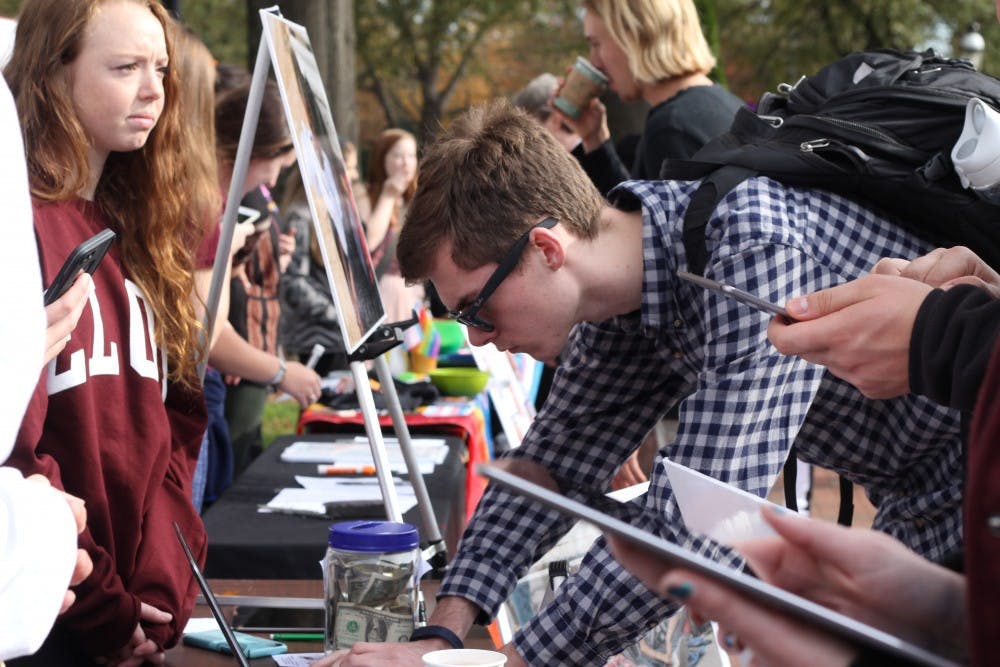With three iPads, a computer and two mobile smartphones at Tuesday’s College Coffee, a small group of students hoped to make a change and make their voices heard.
The students are Core members — members of the executive staff — of a recently formed organization called Speak Out for Syria (SOS), a group whose mission is to raise awareness and funds for the refugee crisis in Syria.
“I feel like people are interested in learning and hearing about the issue,” said Albert Waters, SOS president. “Some students might not follow the news so this organization and our mission gives them a way to be better informed.”
The group, which was created only about a month ago, has sponsored tables at College Coffee in past weeks, but this time was different.
This time, they didn’t just educate a passersby about issues happening abroad, but instead conversed about decisions being made closer to home in North Carolina’s state capital.As students approached their table, the group informed them about North Carolina Gov. Pat McCrory’s Monday announcement in which he, joining more than a dozen other GOP governors, asked the federal government to stop the flow of Syrian refugees into the state.
Using an online contact form through McCrory’s website, Elon University students, faculty and staff wrote a personal message to the governor, including per the request of SOS, “On behalf of the Elon Community.”
Students speak up
Freshman David Proano, who wrote to McCrory through SOS, said he hopes McCrory will consider both possible paths — either opening up the border to refugees or denying entrance.
“Whichever path they choose should be well thought-out,” Proano said. “[Lawmakers and politicians] should consider how it will effect Syrians and Americans.”
Some students wrote to McCrory out of sympathy for Syrians.
“If the situation was reversed, we would want people to help us,” said sophomore Sierra Seawright. “We shouldn’t reject Syrian refugees if they’re in need.”
North Carolina deals with immigration issues
Syrian refugees aren’t the only immigrants that North Carolina has dealt with in recent months.
Back in October, McCrory introduced HB-318, a piece of legislation that places limitations on the types of ID’s immigrants can use.
Freshman Sary Martinez, originally from Honduras, saw similarities between McCrory’s denial of refugees and HB-318, which she said is causing some in the Latino community to struggle.
“[McCrory’s refusal of refugees] is another selfish way of seeing immigration,” Martinez said. “Everybody deserve equal opportunities and shouldn’t be judged by where they’re coming from or what they believe.”
Some link recent anti-Syrian outcry from state governors to the Nov. 13 attacks in Paris.
From my perspective it’s more that McCrory’s decision relates with the attacks in France,” said Tyson Meredith, instructor in political science. “That’s what’s leading to 29 different governors coming out and stating that they don’t want to accept a certain number of individuals.”
According to the U.S. State Department, the U.S. had accepted 1,854 Syrian refugees as of September 2015.
While the United States hopes to welcome about 10,000 Syrian refugees over the next year, many Democrats, including Hillary Clinton and Martin O’Malley, hope to see that number increase to 65,000.
Freshman Jess Pusch, one of the six Core members for SOS, said she hopes the organization’s work on campus is raising awareness about Syria amongst students.
“I think anyone who has ever felt at home somewhere has an obligation to people who do not have a home,” she said.


